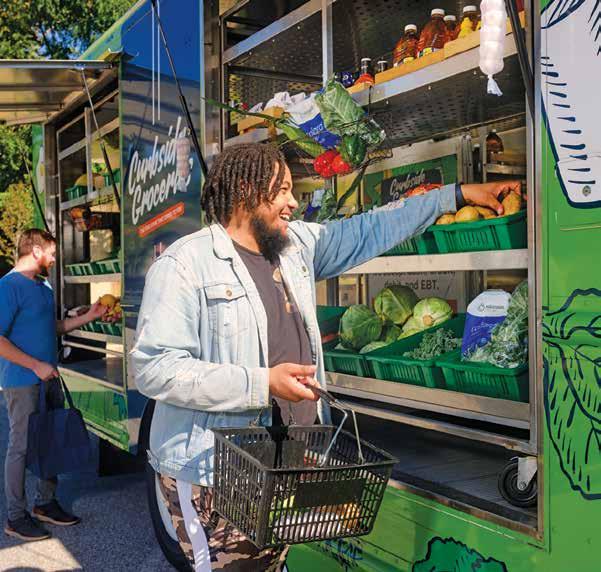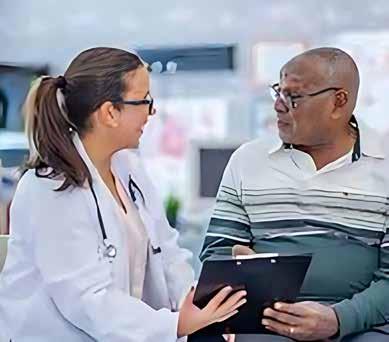
8 minute read
Prince George's County
Eugenia’s Story: Why Flu Vaccines are Important
Submitted by Amerigroup Maryland
It was the Holiday season and school was out, so Eugenia had the opportunity to visit and spend quality time with her grandchildren. Her youngest, who was five years old and on break from kindergarten, had what seemed to be a mild case of the sniffles, but she was Eugenia’s favorite and that was not going to stop her from hugging, snuggling and spending time together. Almost a week after that visit, Eugenia started to feel under the weather. She thought that she might have caught a bug that the kids brought home from school, but it wouldn’t be the first time and thought it would pass. Eugenia hadn’t gotten around to getting her flu vaccine yet that year, and she had type 2 diabetes – a disease that is all too familiar to the Black community. As the days passed, it became obvious that Eugenia had the flu, and she was struggling to control her glucose levels. She knew how much insulin she was supposed to take as well as what she should and should not be eating, but she didn’t know that when a person is sick, their body manufactures additional glucose to provide energy to fight infection, and that the body releases stress hormones that can reduce the effectiveness of insulin.
After not being able to get her glucose levels under control, Eugenia’s next visit was to a hospital. She experienced diabetic ketoacidosis, then pneumonia, then kidney failure and finally multiple organ failure. Eugenia didn’t make it home from the hospital, and her family was left wondering what if she had gotten vaccinated against the flu before visiting the kids? What if all the grandchildren and the entire family had been vaccinated against the flu?
Eugenia was one of 42.9 million people in the U.S. who caught the flu that year, and one of approximately 52,000 people who died. A disproportionate number of these deaths were among adults who were Black, and there could be a number of reasons for this disparity. Black adults have lower rates of immunizations against the flu than white adults. The CDC reports that less than 43 percent of Black men and women were vaccinated during the 2021-2022 flu season. Additionally, people who have chronic disease are more likely to suffer complications, be hospitalized and die from the flu. Black adults have higher rates of heart disease and diabetes than their white counterparts, and during the 20212022 flu season, flu hospitalization rates were 80 percent higher among Black adults than white adults.
Many people miss opportunities to vaccinate, and many times it turns out to be regrettable, but misinformation and vaccine distrust should never be the reason a person loses their life to the flu. The flu vaccine has been proven to be safe for most people over the age of six months. There are even safe alternatives for children and adults with certain allergies and sensitivities. Flu vaccines are easily accessible via pharmacies, shopping super centers, at doctor’s offices and clinics, and they are available at no cost to people with health insurance. Most importantly, decisions to vaccinate should always be based on credible information: https:// www.cdc.gov/vaccinesafety/vaccines/ flu-vaccine.html.
Amerigroup Maryland is a huge supporter of flu vaccination and offers assistance to people who need help accessing vaccines or information. Amerigroup offers a website where members or guests can search for care providers who administer vaccines: https://findcare.amerigroup.com/ search-providers. Amerigroup also offers its member help by phone: 1-800600-4441 (TTY 711). Additionally, Amerigroup members may be eligible for gift card rewards – just for getting vaccinated against the flu. To read more about Amerigroup Maryland’s Healthy Rewards, visit https://www. myamerigroup.com/md/benefits/ medicaid-healthchoice-benefits.html.
Thousands of lives can be saved if individuals and their families get vaccinated against the flu. Eugenia’s family will always wonder how things could have been different if their entire family had been vaccinated. Take action today to catch up on your vaccines, so your family doesn’t have to experience the tragedy Eugenia’s did – or be left wondering.
D ot detacide y .htlaeh ruo D ot detacide y .ytinummoc ruo
8 YTT( 1444-006-007 )11 m/moc.puorgiremaym d
H .htlaeH fo tnemtrapeD dnalyraM eht fo margorp a si eciohChtlae
1 12/80 PGANECDM128220
AMERIGROUP MARYLAND UPDATES AND REMINDERS:
On January 1, 2023, Amerigroup Community Care, also known as Amerigroup Maryland, will begin operating as Wellpoint. There will be no change to members’ coverage as a result of this name change. Until January 1, 2023, members can continue to use their Amerigroup ID cards to access benefits as they always have. Amerigroup members should expect to receive updated materials and more information about this change by early December 2022. Learn more by visiting: https://www.myamerigroup. com/md/mdmd_caid_faqwellpointrebrand.pdf. WI

Black Americans’ Views of Health Disparities Uncovered in Pew Research

By Lee Ross WI Staff Writer
In a recent study from Pew Research, African Americans provided a mixed assessment of the progress that has been made improving health outcomes for Black people. Roughly 47 percent said health outcomes for Black people have gotten better over the past 20 years, while 31 percent say they’ve stayed about the same and 20 percent think they’ve gotten worse.
Less access to quality medical care is the top reason Black Americans see contributing to generally worse health outcomes for Black people in the U.S. Large numbers also believe environmental quality problems in Black communities, and hospitals and medical centers giving lower priority to the well-being of Black people also play vital roles in health inequity.
“The pandemic has been a stark reminder of the disparate health outcomes Black Americans face. It was essential for the survey to be able to speak to health and medical experiences. The health and medical care system is one of the primary ways people encounter science in their daily lives,” said Cary Funk, director of the Pew Research Center’s science and society research. “There are ongoing efforts to address systematic bias in the medical care system, as well as efforts to improve trust between Black Americans and the broader science, medical science, and public health communities. And while this research was in the works before the coronavirus outbreak, the pandemic has been a stark reminder of the disparate health outcomes Black Americans face. It was essential for the survey to be able to speak to health and medical experiences.”
Funk said that one of the chief aims of the study is to gain insight into the potential barriers and opportunities to deepen engagement with science among Black Americans. More importantly, the research highlighted the impact of discrimination – real or perceived – in how African Americans sought care, from whom, and to what extent healthcare advice was followed.
The experiences of younger Black women in the medical system, for instance, showed that a large majority of Black women ages 18 to 49 reported having experienced at least one of seven negative health care experiences. They are also more likely than other Black adults to say they would prefer a Black health care provider for routine care and to say a Black doctor or other health care provider would do a better job than medical professionals of other races and ethnicities at providing them with quality medical care.
Such was the case with Charleesa Graham, 32, a graduate student living in D.C.’s Petworth neighborhood, who recently relocated from Florida. After developing asthma while living near Coral Gables, she said she could not get a grasp on the condition or even a proper diagnosis because the physicians had such a poor bedside manner or treated her disrespectfully.
“The attitudes of the hospital workers was very curt and direct, there was no compassion or empathy even though it was clear I was having trouble breathing. They seemed more interested in whether I was taking illegal drugs,” Graham said. “I left the hospital and returned to my apartment where a neighbor recognized my symptoms as a potential asthma attack and took me to a local botanica for an herbal tincture.”
Graham said since then, she chooses only doctors with cultural competencies of the Black community or naturopathic physicians who treat holistically. She said that while natural medicine is not for everyone, every person should feel comfortable in the care of the doctors who are paid to treat them.
The complexities of public trust were found to drive the breakdown in communication between health systems and physicians and the people they serve. Pew also found that Black Americans expressed a wariness about medical researchers’ trustworthiness when it comes to admitting their mistakes and taking responsibility for them when they happen – with 61 percent of Black adults noting that medical research misconduct is just as likely to occur today as it was in the past. With historical injustices including the Henrietta Lacks (HeLa cell) abuses and those of the Tuskegee Syphilis experiment ever-looming, African Americans readily reject the idea that safeguards are in place today to prevent serious cases of research misconduct.
“This is not about bad doctors; it is about finding the right fit to ensure we get the best care possible. It is also important that Black people keep up with those preventative healthcare appointments and adhere to the common-sense guidelines that they are given. This cannot happen if we do not trust the doctors, or the doctors have a not-so-hidden bias.” Graham said. WI

MENTION THIS AD FOR 15% OFF
YOUR FIRST PURCHASE!
FRESH PRODUCE. FRESHER PRICES.
SHOP FOR YOUR GROCERY ESSENTIALS CLOSE TO HOME
WEEKLY STOPS IN DC AND PRINCE GEORGE’S COUNTY











